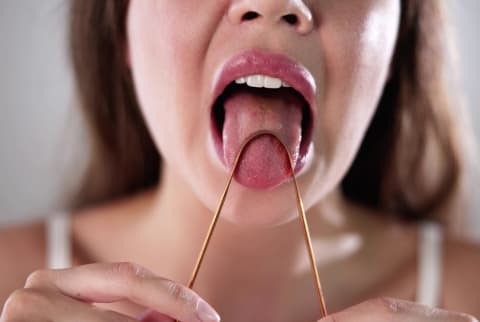Advertisement
4 Reasons You Should Start Tongue Scraping For Your Overall Health


Mark Burhenne, DDS (aka, Ask the Dentist), has officially convinced our entire editorial team to start tongue scraping. We even took a few minutes from our weekly pitch meeting to shout out our favorite tools and wax poetic about our (icky) results. Just another Monday at mindbodygreen!
Now, tongue scraping is by no means a new habit. It's a centuries-old ritual in Ayurveda, known as Jihwa Prakshalana. But after listening to Burhenne rattle off the underrated benefits on an episode of the mindbodygreen podcast, we have even more appreciation for the oral health practice.
"Tongue scraping is the most underappreciated aspect of oral care," Burhenne declares. "Everyone should be tongue scraping." Below, he lists a few reasons why:
To prevent bad breath
Ready for a hot take? "If you have bad breath, mouthwash actually makes it worse," says Burhenne. He compares it to deodorizing something rancid with a spray—it might mask the smell for a few minutes, but the odor will surely come back with a vengeance.
Rather, you'll want to address the source of the odor to clear it effectively. Scraping your tongue does just that by reducing bacteria buildup from the back of the tongue.
The research is on Burhenne's side, as one study found1 that manually cleaning the tongue (with a toothbrush or tongue scraper) effectively removes the coating that causes bad breath. Another study2 found that using a tongue scraper twice a day for seven days reduced Mutans Streptococci and Lactobacilli bacteria, both of which are associated with bad breath.
To clean your taste buds
Burhenne compares the tongue to a shag carpet, in that it easily traps debris and bacteria in its nooks and crannies. As that material accumulates over time, it can lead to improper biofilm formation on the tongue and even blunt your taste buds.
And by enhancing the flavor of your food, Burhenne says tongue scraping can even help keep you fuller for longer. Recent research agrees: One study3 found that neurons in the brain respond to taste perception almost immediately, which helps regulate eating behavior. Meaning, don't underestimate the role our mouths have in satiety.
The problem is, if you don't remove buildup on the tongue (à la tongue scraping), your neurons may have a harder time responding to the flavor of your food, thus keeping you from feeling satiated.
To potentially lower blood pressure
"If you tongue scrape, you can actually lower your blood pressure," says Burhenne. It all has to do with nitric oxide, a molecule that influences immune function, weight, circulation, blood pressure, mood, and more.
Bacteria in your oral microbiome are able to produce nitric oxide, and scraping the buildup off your tongue allows it the space to do so. Research even shows4 that regularly cleaning the tongue helps increase nitric oxide levels, thus improving resting systolic blood pressure.
To optimize oral health
Tongue scraping helps disrupt the bacteria buildup on the tongue, which helps balance the oral microbiome—and a balanced microbiome is essential for optimal oral health.
Take it from Burhenne, a solid oral care routine goes beyond brushing and flossing. "Brushing and flossing is not the only thing that saves us," he adds. In fact, "Just do that alone, and you're still going to have decay."
It may seem a bit extra, but Burhenne swears tongue scraping is an essential way to nourish your teeth and gums. He recommends scraping two times a day at first (before brushing your teeth), then checking in every third or fourth day once your microbiome appears more balanced.
The takeaway
If you haven't dabbled in tongue scraping, now you have four reasons to start your daily ritual. It may give you the ick at first (I can totally relate), but the full-body benefits are well worth it. Grab your tool (like this one from Amazon) and start scraping!